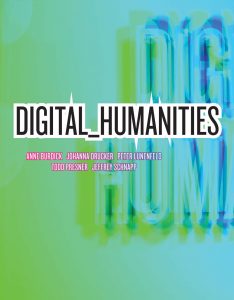Five authors participated in the highly collaborative venture of shared authorship over a multi-year period.
Johanna Drucker, Peter Lunefeld, and Todd Presner teach at UCLA. Drucker is the Breslauer Professor of Bibliographic Studies in the Department of Information Studies, Lunefeld is Professor of Design Media Arts, and Presner is Professor of Germanic Languages and Comparative Literature as well as the chair of the Program in Digital Humanities.
Anne Burdick teaches at Art Center College of Design, where she is Department Chair of Media Design Practices. Jeffrey Schnapp has numerous roles at Harvard, including Professors of Romance Literatures, faculty director of metaLAB, and faculty co-director of the Berkman Center for Internet and Society.
Book Basics
Digital_Humanities is an incredibly rich volume that models the best of the field about which it speaks in its composition and final format. Rather than a collection of essays each by an individual author, each chapter is the work of the full team. Rather than page after page of standard formatting, the design of the words on each page communicates meaning. Rather than a book for purchase, this text is available for purchase as a whole or free of charge via an open access version. Rather than a book about the history of the digital humanities, this contribution by practitioner-theorists offers foundation and documents recent shifts while also pondering future possibilities. Rather than using complex title and subtitle, Digital_Humanities uses a mere two words separated by a single character to communicate a great deal: “The underscore between the two words references the white space between them as a vital yoke and shifting signifier, one that presents the two concepts in a productive tension, without either becoming absorbed into the other” (p.ix-x).
So What?
In the Q&A section on Digital Humanities Fundamentals, the authors begin their answer to the question “What is the Digital Humanties” with these words:
Digital Humanities refers to new modes of scholarship and institutional units for collaborative, transdisciplinary, and computationally engaged research, teaching, and publication.
Digital Humanities is less a unified field than an array of convergent practices that explore a universe in which print is no longer the primary medium in which knowledge is produced and disseminated (p.122).
Furthermore, “recent Digital Humanities activity seeks to revitalize the liberal arts traditions in the electronically inflected language of the 21st century” (p.122).
- Share your experiences of and questions about the Digital Humanities.
- Do you expect the role of the Digital Humanities in higher education to expand, contract, or remain stable over the next few decades? Provide rationale for your position.
Anne Burdick, Johanna Drucker, Peter Lunefeld, Todd Presner, and Jeffrey Schnapp. Digital_Humanities (Massachusetts Institute of Technology Press, 2012). ISBN: 9780262018470.
